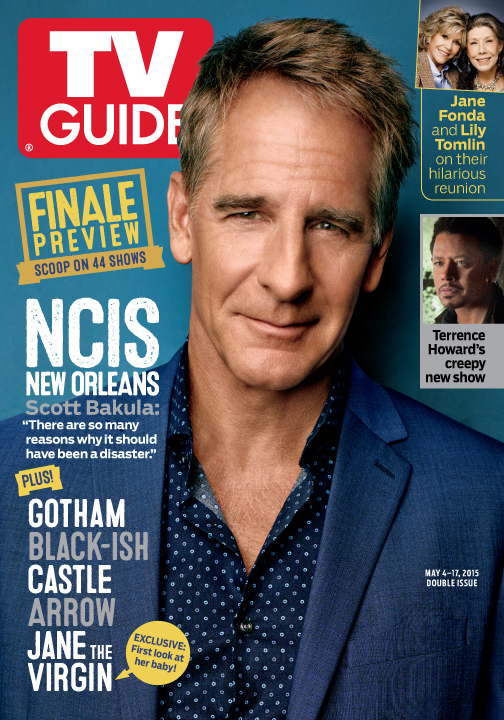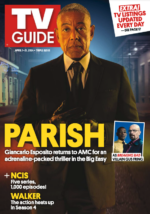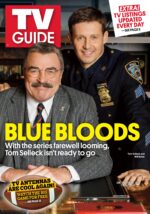Crime is Paying Off for NCIS: New Orleans
 Cover photo of Scott Bakula by Jeff Lipsky for TV Guide Magazine
Cover photo of Scott Bakula by Jeff Lipsky for TV Guide Magazine
At a cover shoot for TV Guide Magazine, the five principal cast members of NCIS: New Orleans have just come in from filming a scene at the soundstage next door, but you might think they’d dropped by after a night at Tipitina’s, the Spotted Cat, d.b.a, or one of Orleans Parish’s other celebrated nightspots. Things are getting loosey-goosey—emphasis on the goosing—as the quintet squeezes in tight. Lucas Black is tickling Zoe McLellan. McLellan is borrowing Rob Kerkovich’s glasses for that sexy librarian look. It’s up to Scott Bakula to provide the voice of reason. “We’ll hate these shots, I guarantee you,” he says, right after having his manly bosom groped from behind by CCH Pounder.
“Are we confused as to the nature of this procedural?” asks Pounder, suddenly sounding a sober note as she takes her mitts off the series’ star.
“This is full-on thank God it’s Friday,” says Kerkovich, usually the show’s comic foil, adding his own note of mock solemnity to this touchy-feely free-for-all: “So many people have died so far.”
Well, yes, they have, rather reliably, at the predictable rate of one corpse per week, with occasional bonus deaths in instances involving a mad bomber or some such. CBS’s NCIS: New Orleans didn’t get to be the season’s top freshman show by not playing by the procedural rules. What sailor would want to be stationed here after watching a series, which, if taken literally, suggests that Louisiana has an exponentially higher mortality rate among active and former servicemen and servicewomen than any other seaport state?
Probably a lot of impressionable petty officers are champing at that bit, actually, since the series also suggests that it’s worth the risk of being infected with bubonic plague, murdered vampire-style in a cemetery, poisoned with radiation, or shot during Mardi Gras just to live and thrive amid the city’s infectiously celebratory spirit. And although all the principals have been given—in typical NCIS-franchise fashion—slightly angsty backstories, a typical episode is less likely to end on a brooding close-up than with the characters cooking gumbo for one another in the squad room’s kitchen. And can it even be called a squad room, when the cozily funky office set looks like the House of Blues blew up, albeit with most-wanted lineups on the overhead monitors instead of drink specials?
If procedurals are a kind of comfort food, the good-times-and-autopsies mélange of NCIS: New Orleans managed to attract a whopping 18 million viewers (including DVR), on average, in Season 1 by being primetime’s oysters on the shell or its sugary beignet or nightcapping Sazerac.
“Part of what drew me to setting a show down there,” says creator and executive producer Gary Glasberg, “is the contrast of people who work hard and have faced all kinds of adversity—whether it’s Katrina or socio-economic problems—but hold on to each other and rise up and celebrate regardless. And the beauty of New Orleans is that there’s literally a parade or festival for everything. So you’re constantly working around that.” Sometimes they’re also working around that festiveness psychologically, as the city’s eternally high-spirited side can carry over into a kind of light-headedness at the workplace.
“But,” says McLellan (Agent Meredith Brody), “then we have to be reminded, ‘OK, someone’s dead,’ and remember the urgency of the story we’re telling. Especially when the baby was missing [in the April episode “Rock-a-Bye-Baby”]. It’s like, ‘You care about this baby!’ Got to find the baby! Find the Navy baby!” That last singsongy catchphrase has become a running joke between Black and McLellan—with apologies to missing naval infants everywhere, we’re sure.
Maybe they’ve earned this levity, given the pressure everyone faced at the start of the season just to produce a coherent show, with very little time for conceptual lollygagging. “There was a lot of tension at the beginning,” Black says, “but after we got on air, people at the network began to trust us more, and it felt a little more relaxed on set.” A little? “There was a point during this season where we felt comfortable to do our own thing a bit more, because it was like, ‘Huh! People like us!’” And those people have made this the most successful first-year drama since Desperate Housewives exactly a decade earlier.
But in the first year of any show, says Bakula (a veteran of Quantum Leap, Star Trek: Enterprise, and Men of a Certain Age, among many others), “you just never feel like you have your legs underneath you.” He recounts the series’ hurried history, which began with an embedded pilot that took the form of a two-parter on NCIS in spring 2014: “When we actually got the formal invitation that we were being picked up, it was the beginning of May, and then the scramble began to start shooting July 21. This place [in a New Orleans suburb] went from an empty soundstage to something we were shooting on in five weeks. The first day of shooting, they’d barely sealed the paint on the walls and hadn’t hung any lights.
“We’re not all in the same place, either,” he continues, “so there are so many reasons why it should have been a disaster.” He’s talking about how Glasberg and the writing staff stayed in Los Angeles—and so, in a way, did Bakula, who flew home every weekend, not wanting to uproot his family just as his son was entering high school. Somehow, Bakula also flew to San Francisco a few times to shoot three episodes of HBO’s Looking, fulfilling his promise to wrap up a supporting role on that niche drama’s second season even as he was anchoring TV’s hottest new mainstream show. But that shoulda-been disastrousness “hasn’t been,” he says. “And because they picked us up so early, all our directors are lined up for next year, so invariably it’s going to be an easier process.” Not the big easy, mind you—since, Bakula says, “they keep making the episodes bigger and harder to do”—but easier.
First, there’s a freshman season to wrap. Back on the soundstage, Bakula is shooting a scene for the penultimate episode with Steven Weber (Wings), who has a recurring role as a presumably corrupt city councilman whose unctuousness can be measured by his insistence on wearing sharp suits even in the harshest humidity. You can see the familiarity between these TV pros when they both flub their lines and Bakula quips, “Together, we almost add up to one actor.”
Their characters are discussing the city-rattling repercussions of violence perpetrated by Baitfish, a villain who’s been Special Agent Dwayne Pride’s bête noire throughout the season. No spoilers here, but suffice it to say that Baitfish’s mayhem is the focus of the May 5 episode, which opens the door to an even wider world of crime involving the New Orleans seaport in the May 12 finale. Weber’s politician and Bakula’s determined Pride are going at it over who’s to blame for some very public casualties, before Weber finally lowers his voice and says, “No matter what you think of me, I love this city too.” Which may be setting Weber up to be more sympathetic in Season 2, because, really, how can anyone crush so hard on NOLA and be all creep?
Just as the medical profession’s primary dictum is “First, do no harm,” this show’s initial mission was: Don’t tick off the host city. By that measure, too, the series has been a smashing success—even if everyone you run into in New Orleans will eagerly tell you, unprompted, which actors get the accents right.
“Everybody thinks I’m faking it,” says Black (Special Agent Christopher LaSalle), the lone primary cast member with a real-life Southern twang, thanks to his upbringing in nearby Alabama. “I’ve worked on this accent for 32 years. I feel like I’ve finally got it down pat. It’s a struggle, what we go through as actors.” Another thing he doesn’t actually struggle with: “I love the steaming heat, and I get to laugh at everybody who doesn’t.”
Pounder, who plays coroner Loretta Wade, had a tougher time adjusting, even though she’s gradually shifting her home base from L.A. to New Orleans. “I have to have faith that if the first [NCIS] show has been running for 12 years, maybe the second show [NCIS: Los Angeles] will run for eight years, and maybe this show will run for six or seven.” But, she adds, “I’m a Caribbean person, and this is a Caribbean country, stuck in America. Well, not stuck—happily hanging out in America—and therefore it has all the problems that that has: The heat come summertime is hellish, and that’s when we start our [production] season. I’m hoping to drop enough weight so that the water’s not just pouring out of me like it did last year, when I thought, ‘I’m going to die.’”
Northeast native Kerkovich arrived at an analogy for the city after first visiting (and feeling out of place on) legendarily rowdy Bourbon Street: “A local reporter asked me, ‘What do you think about New Orleans?’ I said. ‘It’s like Bartertown,’ from Mad Max Beyond Thunderdome, which couldn’t be more obscure, because Bartertown isn’t even in the title of the movie. I thought, ‘This interview has tanked.’ I referenced the third Mad Max movie?’” (Yes, the resident forensic scientist is at least as ready with the pop cultural references off screen as on.) “But it’s cool to not be in the L.A./Hollywood world. Here you can go into a coffee shop and not every single person is working on a screenplay. They’re all on their laptops writing jazz.”
Bakula, who’s developed a list of favorite local nightspots despite spending his weekends in L.A., laughs when he’s reminded how he initially hoped the series could be filmed in Hollywood. “There’s a huge commitment to trying to do it correctly here,” he says. “I’ve lived in a lot of great cities in the United States, but this one’s unique in that people are always saying to me, ‘We love what you’re doing here. How are you liking my city?’ There’s this possessiveness about it. You don’t usually hear people say, ‘How are you loving my Santa Monica?’ I love how the people do things outside their homes here, which is kind of counter to the world that’s becoming more like, ‘How can I watch a movie in my house?’”
Not that anyone at this photo shoot wants to discourage NCIS: NOLA binge-watching, although it can lead viewers to mistake the actors for their characters, which they still find amusing. McLellan recalls an exchange she had with a local on Frenchmen Street. “My sister and I went out to hear music,” she says, “and as I go up to the bar to get a drink, this college girl is standing there and is like [affects thick Louisiana accent], ‘Brody, oh my God, hi! Is Pride with you?’ I said no. She said, ‘Good, because I’d do him right here.’”
Perhaps they need to throw in even more morgue scenes, then? Because while this show may be big, it probably shouldn’t feel that easy.
NCIS: New Orleans airs Tuesdays, 9/8c, CBS
- Season finale scoop on Castle, The Flash, Once Upon a Time, Jane the Virgin, and more
- Jane Fonda and Lily Tomlin preview their new Netflix comedy series Grace and Frankie
- On the set of M. Night Shyamalan’s new Fox thriller Wayward Pines
- From screen to panel: TV shows get the comic-book treatment




